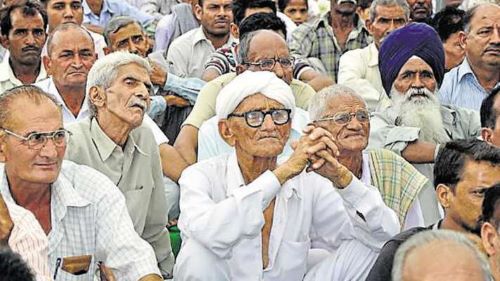Context-
India is experiencing a significant demographic shift with a rapidly growing elderly population, presenting challenges in healthcare, economic support, and social care. While much attention is given to the country's youthful demographic, the aging population is often overlooked. Here we explore strategies to empower India's elderly, particularly focusing on supporting the poor, rural, and women.
The Growing Elderly Population in India
The demographic landscape of India is witnessing a profound change, marked by an increasing number of elderly individuals. According to the India Ageing Report 2023, there are approximately 149 million people aged 60 years and above, comprising about 10.5 percent of the population, with projections indicating a doubling of this figure by 2050. This demographic transition is further accentuated by the growth of the oldest-old population, aged 80 years and above, which is expected to reach about 3.3 percent by 2050.
Challenges Faced by Rural Elderly, Particularly Women
A substantial portion of India's elderly reside in rural areas, facing unique challenges exacerbated by factors such as illiteracy, financial dependency, and societal discrimination. Elderly women, in particular, confront significant vulnerabilities, often lacking education, financial resources, and autonomy. With limited access to healthcare and social services, rural elderly individuals, especially women, rely heavily on familial support, rendering them susceptible to neglect and exploitation.
According to the India Ageing Report 2023, nearly 70 percent of the elderly in India reside in rural areas. Furthermore, approximately 40 percent of the country's elderly belong to the poorest quintile, with around 18.7 percent living without any income. Moreover, a significant proportion of elderly women, approximately 33 percent, have never worked and lack any source of income.
Impact of Urban-Rural Disparities on Elderly Healthcare
While urban areas, especially metropolitan cities, boast better healthcare infrastructure, a significant portion of India's elderly population residing in rural regions lacks access to basic medical facilities. The growing urban-rural disparity in healthcare exacerbates the challenges faced by elderly individuals in remote areas, highlighting the urgent need for comprehensive geriatric care initiatives tailored to rural settings.
Challenges in Elderly Care Provision
India's existing healthcare framework predominantly focuses on maternal and child health, neglecting the specific needs of the elderly population. With shifting family structures and increasing migration of younger generations, the traditional reliance on familial support for elderly care is diminishing. Consequently, there is a growing demand for formal institutionalized care options. However, the current provisions fall short of meeting the diverse needs of the elderly, particularly those from marginalized communities.
● Financial Empowerment through Pension and Social Security
Enhancing financial independence among the elderly is crucial for mitigating economic vulnerabilities. India's pension and social security systems require significant strengthening to alleviate the dependence of elderly individuals on their families. According to a recent NITI Ayog report on senior care reforms, only 11 percent of elderly men receive pensions from their previous work, while a mere 1.7 percent of elderly women receive such pensions. Initiatives such as expanding public pension coverage, implementing mandatory savings plans, and introducing reverse mortgage mechanisms can bolster financial security among the elderly, particularly women and those from low-income backgrounds.
● Improving Access to Healthcare Services
India's healthcare infrastructure must evolve to address the multifaceted health needs of the elderly population. A holistic geriatric care model is imperative, encompassing preventive, curative, and rehabilitative services tailored to the unique requirements of elderly individuals, including mental health support. Moreover, efforts to enhance healthcare accessibility in rural areas and smaller towns are paramount to ensuring equitable healthcare provision for all elderly individuals, irrespective of their geographical location.
● Capacity Building in Geriatric Care
The shortage of skilled healthcare professionals specializing in geriatric care poses a significant challenge to effective elderly healthcare delivery. According to experts, prioritizing the training and capacity building of geriatricians, physiotherapists, nurses, and other healthcare professionals is essential to bridge this gap. Additionally, the establishment of facilities such as elderly care centers and day-care facilities can provide essential support to both elderly individuals and their caregivers, particularly in rural areas with limited healthcare resources.
Enhancing Public Awareness and Education
Addressing the prevailing stigma and misinformation surrounding elderly care is crucial for fostering a supportive societal environment. Public awareness campaigns aimed at disseminating information about available services and resources for elderly care can play a pivotal role in promoting understanding and empathy toward the elderly population. Educational programs focusing on geriatric health issues and caregiving techniques are essential for sensitizing the public and empowering individuals to provide better care to elderly family members and community members.
Conclusion
Empowering India's elderly, particularly the poor, rural, and women, necessitates a comprehensive approach encompassing financial, healthcare, and societal interventions. By bolstering financial security, enhancing healthcare provision, building capacity in geriatric care, and fostering public awareness, India can endeavor to create an inclusive and supportive environment for its aging population. As the nation progresses towards achieving a demographic dividend, it must simultaneously prioritize the well-being and dignity of its elderly citizens, ensuring that they receive the care and support they rightfully deserve.
|
Probable Questions for UPSC Mains Exam- 1. How do the challenges faced by rural elderly individuals, particularly women, differ from those experienced by their urban counterparts in India? (10 Marks, 150 Words) 2. What are the key initiatives proposed to enhance financial empowerment among India's elderly population, as outlined in the NITI Ayog report on senior care reforms? (15 Marks, 250 Words) |
Source- ORF







